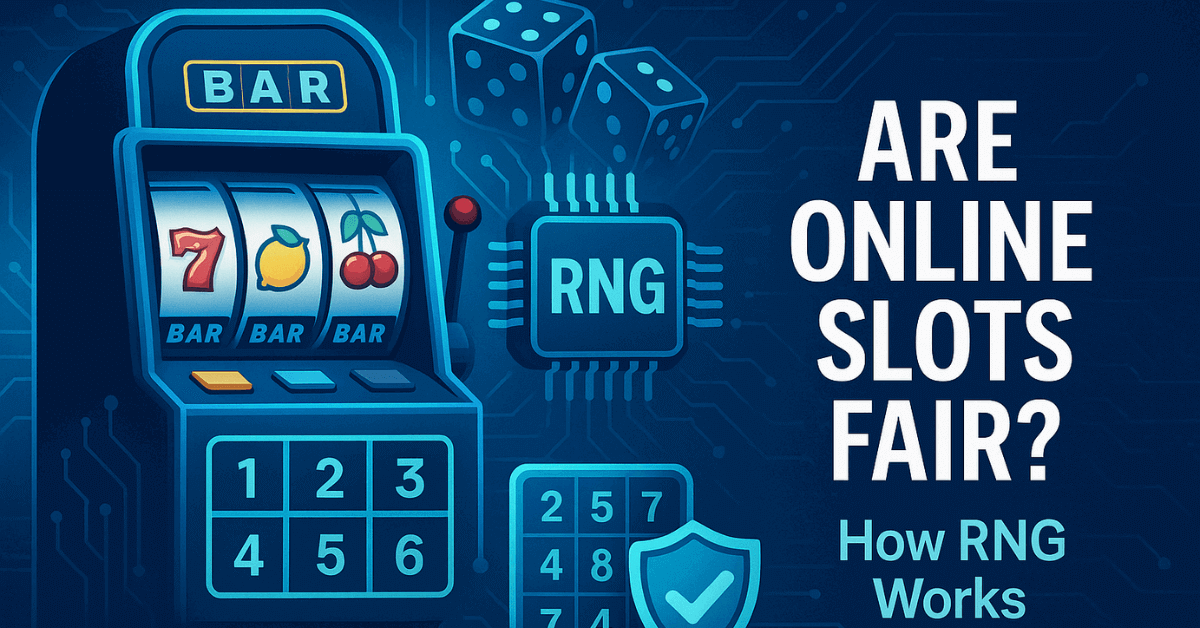
The rapid growth of online casinos has raised important questions among players: Can I trust these games? Are online slots fair? Is there a way to know if a slot machine is rigged? These are legitimate concerns, especially as more people enter the world of iGaming. The short answer is yes, online slots are fair — provided they are licensed and use certified Random Number Generators (RNGs). Let’s break down exactly how it all works.
What Is a Random Number Generator (RNG)?
A Random Number Generator is a complex algorithm used by all reputable online slot games to ensure that every spin outcome is entirely random and independent. In modern iGaming, RNGs are not just basic programs — they are cryptographically secure systems that:
- Generate thousands of numbers per second
- Assign each number to a symbol/reel position combination
- Ensure that every spin is unrelated to the previous or next spin
Because outcomes are determined before the reels stop spinning, animations are just visual representations — the actual result is decided instantly by the RNG.
Why RNG Is Crucial for Fairness
Without an RNG, slot games could be easily manipulated by either the player or the operator. RNGs prevent this by removing predictability. They are used to:
- Ensure transparency in game outcomes
- Protect players from rigged games
- Maintain integrity of licensed online casinos
Fairness is not optional. In regulated markets, RNG systems must be tested and certified by independent auditors like eCOGRA, iTech Labs, or GLI.
Are RNGs Truly Random?
Technically speaking, computer-generated RNGs are “pseudo-random” because they use seed values and mathematical formulas. However, these systems are so sophisticated that the outcome cannot be predicted by any user or operator.
In practice, for a player spinning a slot, the result is as good as random.
How Slot Fairness Is Tested and Certified
To ensure slot games are not rigged, developers and operators must undergo rigorous testing and certification. Here’s how:
Independent Testing Labs
Organizations like:
- eCOGRA (eCommerce Online Gaming Regulation and Assurance)
- iTech Labs
- Gaming Laboratories International (GLI)
…perform evaluations on:
- The RNG engine (statistical randomness)
- Return to Player (RTP) accuracy
- Game performance under stress
- Security against tampering or external attacks
Once certified, games receive digital seals or licenses.
Licensing Requirements
Regulators such as:
- MGA (Malta Gaming Authority)
- UKGC (UK Gambling Commission)
- Curacao eGaming
…require strict compliance with RNG and RTP standards. Games must be periodically audited.
What Is RTP and How Does It Relate to Fairness?
Return to Player (RTP) is the theoretical percentage of all wagers that a slot will return to players over the long run. For example, a 96% RTP means the slot pays back €96 for every €100 wagered, on average.
While RTP doesn’t guarantee a result on a single spin or even a session, it does give an idea of the game’s design. The RNG ensures the outcome is random, while the RTP ensures fairness over time.
Important: High RTP does not equal high chances of winning immediately. RNG keeps each spin independent.
Are Online Slots Fair? Can They Be Rigged?
In regulated environments — no. Rigging a slot game would not only be illegal, but virtually impossible with certified RNGs and strict licensing conditions.
However, unlicensed casinos or rogue software providers may offer unfair games. That’s why it’s critical to play only at:
- Licensed casinos
- Games from trusted developers (e.g., NetEnt, Play’n GO, Pragmatic Play)
- Sites that display certification seals
Player Tips to Ensure You’re Playing Fair Games
- Check for a license: Look for regulators like MGA, UKGC, or Curaçao
- Look for certification badges: eCOGRA, GLI, etc.
- Play well-known providers: Trusted studios follow all RNG standards
- Read reviews: Use reputable sources for information
- Avoid “too good to be true” offers on shady platforms
Future of RNGs and Slot Transparency
The industry is moving toward even more transparency. Some trends include:
- Provably Fair Technology: Especially in crypto casinos, where results can be independently verified
- On-screen RNG audits: Live stats or results overlays
- AI-Based Monitoring: Detecting suspicious behavior patterns automatically
Final Thoughts
So, are online slots fair? If you’re playing at a licensed online casino using certified RNG software — absolutely.
RNGs are at the core of fairness in slot gaming. Combined with regulated RTP and third-party audits, they create a secure and transparent experience for players.
Understanding how these systems work helps you make better choices, avoid rogue platforms, and enjoy the thrill of slots responsibly.